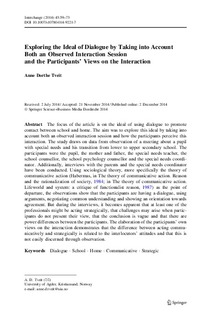| dc.contributor.author | Tveit, Anne Dorthe | |
| dc.date.accessioned | 2015-02-20T08:34:58Z | |
| dc.date.available | 2015-02-20T08:34:58Z | |
| dc.date.issued | 2014 | |
| dc.identifier.citation | Tveit, A. D. (2014). Exploring the ideal of dialogue by taking into account both an observed interaction session and the participants’ views on the interaction. Interchange, 45(1-2), 59-73. doi: 10.1007/s10780-014-9221-7 | nb_NO |
| dc.identifier.issn | 0826-4805 | |
| dc.identifier.uri | http://hdl.handle.net/11250/276834 | |
| dc.description | Published version of an article in the journal: Interchange. Also available from the publisher at: http://dx.doi.org/10.1007/s10780-014-9221-7 | nb_NO |
| dc.description.abstract | The focus of the article is on the ideal of using dialogue to promote contact between school and home. The aim was to explore this ideal by taking into account both an observed interaction session and how the participants perceive this interaction. The study draws on data from observation of a meeting about a pupil with special needs and his transition from lower to upper secondary school. The participants were the pupil, the mother and father, the special needs teacher, the school counsellor, the school psychology counsellor and the special needs coordinator. Additionally, interviews with the parents and the special needs coordinator have been conducted. Using sociological theory, more specifically the theory of communicative action (Habermas, in The theory of communicative action. Reason and the rationalization of society, 1984; in The theory of communicative action. Lifeworld and system: a critique of functionalist reason, 1987) as the point of departure, the observations show that the participants are having a dialogue, using arguments, negotiating common understanding and showing an orientation towards agreement. But during the interviews, it becomes apparent that at least one of the professionals might be acting strategically, that challenges may arise when participants do not present their view, that the conclusion is vague and that there are power differences between the participants. The elaboration of the participants’ own views on the interaction demonstrates that the difference between acting communicatively and strategically is related to the interlocutors’ attitudes and that this is not easily discerned through observation. | nb_NO |
| dc.language.iso | eng | nb_NO |
| dc.publisher | Springer | nb_NO |
| dc.subject | dialogue | nb_NO |
| dc.subject | school | nb_NO |
| dc.subject | home | nb_NO |
| dc.subject | communicative | nb_NO |
| dc.subject | strategic | nb_NO |
| dc.title | Exploring the ideal of dialogue by taking into account both an observed interaction session and the participants’ views on the interaction | nb_NO |
| dc.type | Journal article | nb_NO |
| dc.type | Peer reviewed | nb_NO |
| dc.subject.nsi | VDP::Social science: 200::Education: 280 | nb_NO |
| dc.source.pagenumber | 59-73 | nb_NO |
| dc.source.volume | 45 | nb_NO |
| dc.source.journal | Interchange | nb_NO |
| dc.source.issue | 1-2 | nb_NO |
| dc.identifier.doi | 10.1007/s10780-014-9221-7 | |
